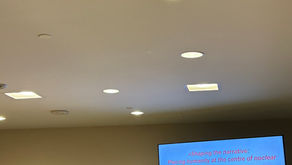
Our Commitment
UN House Scotland is dedicated to SDG 16: Peace and Security. A vital element to achieving SDG 16 is the elimination of nuclear weapons across the world and the ratification of the UN Treaty on the Prohibition of Nuclear Weapons. To promote a nuclear weapons-free world, UN House Scotland participates in closed and open seminars and lectures, and hosts open events aimed at collaborating with all levels of society to raise awareness, encourage dialogue, and organize advocacy efforts.
Partnerships
UNHS is a registered partner organisation with the International Campaign to Abolish Nuclear Weapons (ICAN), who won the 2017 Nobel Peace Prize for their work advocating for nuclear abolition and the Treaty on the Prohibition of Nuclear Weapons.

UNHS also works alongside the Acronym Institute for Disarmament Diplomacy and UNA-UK to serve as the coordinating group for ICAN partner organisations in the UK. As the coordinating group, UNHS oversees and governs all ICAN operations within the UK. To get in touch with us at ICAN, please contact the following with further enquiries:
Dr Gari Donn: gari.donn@unhscotland.org.uk
Executive Director, UNHS
Janet Fenton: janet@wordsandactions.scot
Scottish Liaison, ICAN
Dr Rebecca Johnson: rej@acronym.org.uk
Executive Director, Acronym Institute for Disarmament Diplomacy
Ben Donaldson: donaldson@una.org.uk
Head of Campaigns, UNA-UK
We work through many different channels, and thus our work can be accessed from many different sources. For issues relating to Scottish disarmament, you can stay up to date by visiting nuclearban.scot, or @nuclearbanS on Twitter. For international disarmament issues, you can stay up to date by following @nuclearban on any social media platform.
We are always looking for new partners to help us in achieving SDG16 through the prohibition of nuclear weapons. If you are an organisation working within nuclear prohibition and would like to collaborate, please contact us. If you are a student looking to get involved with our nuclear prohibition efforts, visit our internship page.
About the UN Treaty
The Treaty on the Prohibition of Nuclear Weapons (TPNW) was adopted by the UN on the 7th of July 2017. This treaty has developed from decades of dissatisfaction, echoicing criticisms against stagnant progress for international peace and security from the preceding Non-Proliferation of Nuclear Weapons Treaty (NPT). Secretary-General, António Guterres shared these frustrations at the launch of the UN’s new Disarmament agenda in May 2018, where he proclaims the TPNW as a confirmation of the ‘enormous frustration and enormous will of a large -and growing – number of countries that say, “That’s enough!”’

ICAN Executive Director Speaks at UNHS 2016 Conference.
The TPNW is the first international agreement explicitly banning nuclear weapons, with the goal of eliminating them entirely. The treaty’s provisions are legally binding for states that are either a party or a signatory to it. The TPNW is viewed to be an accelerated and, therefore, more effective treaty than the NPT or the Comprehensive Nuclear-Test-Ban Treaty. It prohibits countries from developing, testing, producing, acquiring, stockpiling, and threatening its use for political coercion.
The Treaty upholds SDG 16, the Sustainable Development Goal that promotes Peace, Justice and Strong Institutions. Nuclear weapons inhibit our ability to achieve a stable global society as they present a catastrophic threat to humanity and our environment.
The TPNW treaty entered into force on the 22nd of January 2021, making nuclear weapons now legally prohibited under international law. Currently, the TPNW has 86 signatories and has been ratified by 60 states, most recently Cote d’Ivoire in March 2022. However, there are still many powerful countries that oppose it. These are primarily nuclear states, their allies, and states under umbrella nuclear organisations such as NATO. For example, the US, the UK and France, all oppose the TPNW. This division between nuclear and non-proliferating states has created a polarising power imbalance. Such imbalances can not coexist within global peace, exhorting the need for nuclear states to join and ratify the Treaty. The ratification of a nuclear power would represent a monumental step towards nuclear disarmament, one that could potentially cause a cascade of others following in their footsteps.
Moving forward, the First Meeting of the States Parties (1MSP) to the TPNW will be held in June 2022 in Vienna, Austria. At this inaugural meeting, States parties will gather to implement policies and obligations under the Treaty such as remediating contaminated environments (Article 6), universalising the treaty (Article 12), and setting a deadline for the elimination of nuclear weapons (Article 4). States that are not able or willing to ratify or sign the Treaty are invited to observe the 1MSP. UNHS are working towards encouraging States not party to the TPNW to attend as observers in hopes of integrating them in future disarmament talks. Currently, we are working with ICAN to encourage Scottish parliamentarians to attend as a show of support for the principles and objectives of the TPNW.







































